Struggling to get a restful night of sleep? Then you’ve probably been scouring the internet for foods that promote sleep. You’ll be pleased to know that including tryptophan-rich foods in your child’s diet, may just help increase the variety of your child’s diet as well as their sleep! Keep reading to find out what are tryptophan foods and which foods contain this essential amino acid.
What are tryptophan foods?
In a nutshell, tryptophan is an essential amino acid, a building block used to make protein.
It’s, therefore, no surprise that tryptophan foods are also protein-abundant foods.
If you are wondering about its health benefits and how foods high in tryptophan can help you and your child sleep better, the secret lies in tryptophan’s special role in making a chemical called serotonin.
Foods that increase serotonin
Before I explain how serotonin is used by the body to promote sleep, let’s look at which foods contain the amino acid tryptophan.
As plant-based diets have been believed to extend life by preserving heart health and improving the quality of sleep, plant tryptophan foods have been listed first.
You may also find that the following foods are also referred to as ‘serotonin-rich foods’.
Tryptophan foods (vegan)
Seeds: pumpkin, chia, sesame, sunflower and flaxseeds
Nuts: pistachio, cashew, almonds, hazelnuts
Soya: tofu, boiled soybeans
Oats
Beans and lentils
Tryptophan foods (animal sources)
Cheese: all types especially parmesan, cheddar, mozzarella, romano, Gruyere
Meat: lamb, beef, pork, chicken, turkey
Fish & shellfish: tuna, salmon, trout, snapper, mackerel, snapper, haddock, cod, lobster, crab, shrimp
Whole eggs
How to use tryptophan foods for restful sleep
Encourage your children and family to eat a range of the above plant proteins daily.
Groundnuts and seeds can be added to breakfast cereals or even a breakfast smoothie. Just remember to add oats which double up as a smart carb and also a tryptophan-rich food for a natural sleep aid.
A spread of cashew and almond nut butter on toast is a nutritious breakfast or after-school snack option whilst lentils are tasty and an easy weaning recipe for babies and toddlers.
Adolescents will benefit too from this plant source of iron-rich food.
Tofu is fantastic in a stir-fry whilst cheese, meat and eggs can be used to stuff sandwiches.
You can also cook fish with vegetables for a nutritious and tasty meal.
Better still, prepare casseroles using beans and lentils for an extra boost in tryptophan to help you and your family sleep better.
What is serotonin?
Did you know that tryptophan is an essential ingredient in the body to make serotonin?
This means that foods high in tryptophan are also foods that boost serotonin.
Serotonin is a neurotransmitter that is produced in the gut and brain. It has a wide variety of functions including regulating mood, appetite, digestion and making the sleep hormone melatonin.
But I’d like to let you in on a little secret. For children who suffer from ongoing chronic sleep problems, a doctor may prescribe melatonin as a medication. This may help with sleep as melatonin’s role in the body is to take care of the body’s sleep-wake cycle and rhythm.
However, for natural sleep aid, keep reading to find out how to sleep better using tryptophan foods.
Why tryptophan foods for sleep?
Without tryptophan foods, your child’s body is unable to make serotonin and subsequently melatonin. Melatonin is a hormone, that helps children’s bodies know when it’s time to sleep and wake up. The amount of light, as well as children’s internal clocks, help the body decide how much to make each day. Whilst melatonin levels drop by day, there’s a peak in the evening to alert the body that it’s time to sleep.
Vitamin B6 foods
Now here comes the good part.
Vitamin B6 is another water-soluble micronutrient that has a role in the production of melatonin in the body.
But there’s more. Zinc, magnesium and folic acid are also micronutrients required to make melatonin.
If you are feeling worried that it’s a lot to take on board just for the possible promise of a good night’s sleep, hear me out.
When you encourage your child to eat a balanced diet from a variety of foods, they are most likely eating enough of the essential vitamins and minerals to aid sleep.
If you are interested in vitamin B6 foods, keep scrolling down for a full list of foods
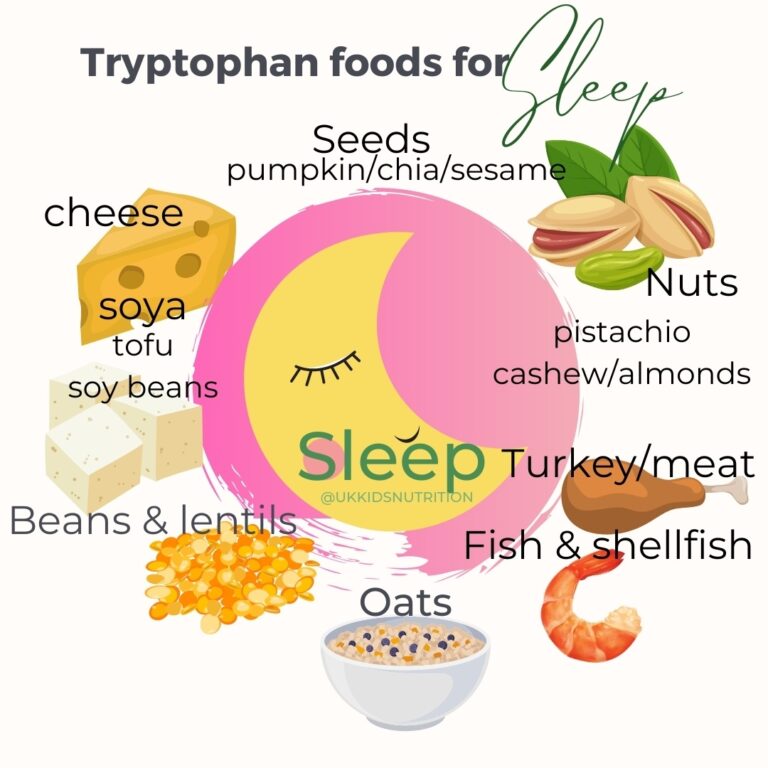
Fruit and vegetables
- Sweet potato
- Potato with skin on
- Carrots
- Prunes
- Avocado
- Banana
Plant foods
- Wheat bran
- Oats
- Pistachios
- Sunflower seeds
- Chickpeas, pinto beans, soybeans and lentils
Meat
- meat
- chicken
- fish
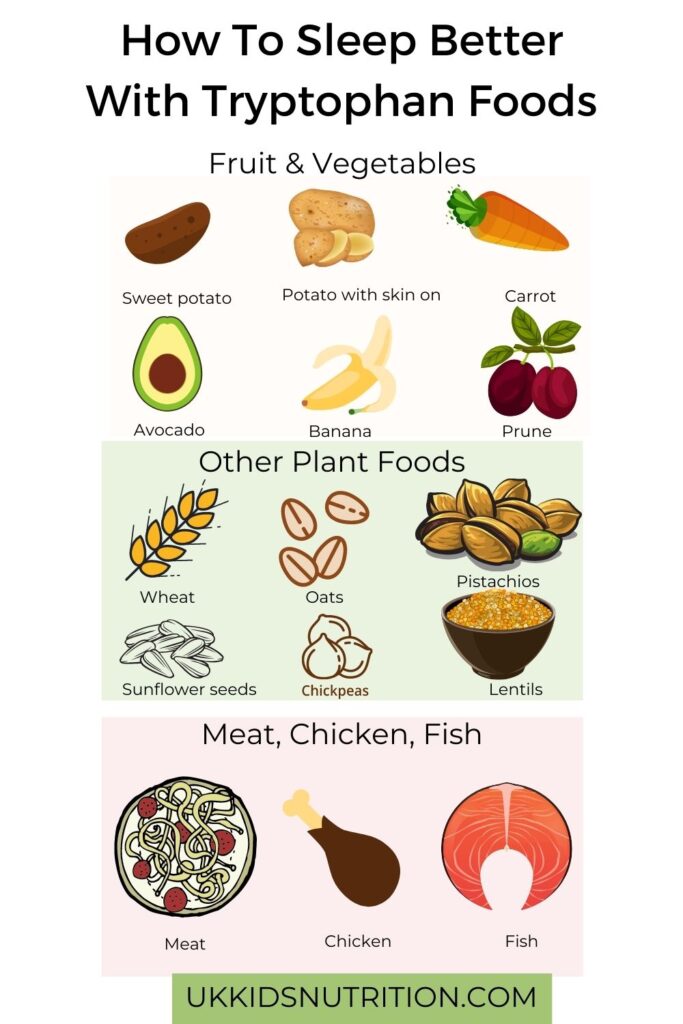
If you’ve optimised your child’s diet for tryptophan foods and B vitamins but still experience sleeping problems have you considered the following?
Sleep routine
Regardless of age, stick to your child’s usual bedtime routine. If it’s dinner, quiet play, brushing teeth followed by the bed, then stick to the routine and repeat this at the same time every day.
Children crave routine and relaxing activities such as a story before bed or a glass of warm milk. It’s relaxing and gets your child prepared for the act of sleep.
If your child is a little older, encourage reflective practice at the end of the day. Encourage them to divulge what’s on their mind to tease out anything that’s troubling them so that they go to bed relaxed and worry-free.

Fluids/bed wetting
Encourage fluids earlier in the day and ask children to visit the toilet each night prior to bed. If they forget, try reminding them to always use the toilet immediately after brushing their teeth so that it forms part of their bedtime routine.
Sugary foods are not linked to bed-wetting, however, some foods can have a lot of hidden salt which can drive thirst. Offer snacks that are light and nutritious such as fruit or yoghurt versus salted crisps, or cheese and crackers.
Be wary of any hidden salt in foods which can drive excessive thirst, particularly by the end of the day.
Here are 9 easy ways to cut back on salt.
Screen time & physical activity
Remember to switch off electronic devices and the television at least 30 minutes to an hour before bed.
Don’t allow children to keep electronic devices in their bedrooms. This reduces the temptation by older children from engaging with social media late into the night.
Replace time restrained or sedentary screen time with additional energetic play, and trade indoor for outdoor time, to promote sufficient sleep.
Remember toddlers need up to 180 minutes of play whilst older children need at least one hour of activity that is of moderate intensity. Walking, dancing, rollerblading, sports and running around in the park all count towards their daily activity scores.
Is dairy useful in promoting sleep?
There isn’t sufficient evidence that milk promotes sleep, but to a child, the act of drinking a warm glass of milk may be comforting. There is some thought that tryptophan present in milk may help promote sleep and hence why it is a popular drink before bed. You now know that tryptophan is a precursor for serotonin which is required to make melatonin in the brain so if you are worried about bedwetting and prefer to skip it, offer a good range of tryptophan (high-quality protein foods) throughout the day instead (see the list above).
Are there any foods that help promote a deeper sleep level for children?
Include tryptophan foods but remember these are proteins and don’t forget vitamin B6-rich foods across meals during the day.
You should also consider smart carbs which are essentially carbohydrate foods that are rich in fibre. What this means is that the glucose from carbohydrate foods is released slowly. This primes your child’s body for (hopefully) a restful night of sleep without any night wakings from hunger or generally feeling unwell.
If you need a guide for screening carbs for fibre, follow this breakfast screening tool here.
The advantage of offering regular meals and snacks to children is that there won’t be any peaks or troughs in their blood glucose levels overnight.
Foods such as sliced banana over toast with a spread of nut butter are easy after school choices for snacking, whilst vegetable sticks with hummus make excellent lunch box foods.
The bottom line
Encourage a diet that is abundant in a range of foods consisting of smart carbs, fruit and vegetables, meat, chicken and fish as well as plant sources of protein to naturally aid sleep via tryptophan foods. A solid sleep routine is important, as is plenty of physical activity to relieve any built-up stress before preparing tired children for a night of restful sleep. How do you manage the children’s sleep in your household?
Let Me Help
Would you like to meet a children’s dietitian who has successfully helped families solve their nutrition problems from around the world?
No matter what you are worried about, I’ll help you manage these with confidence.
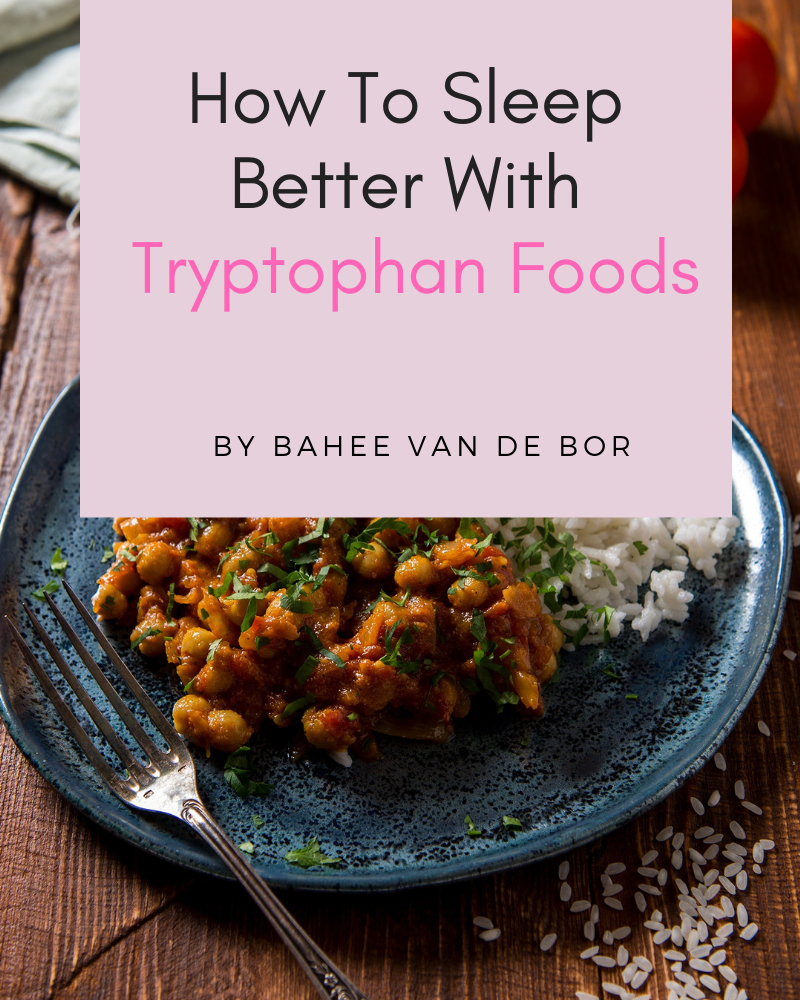


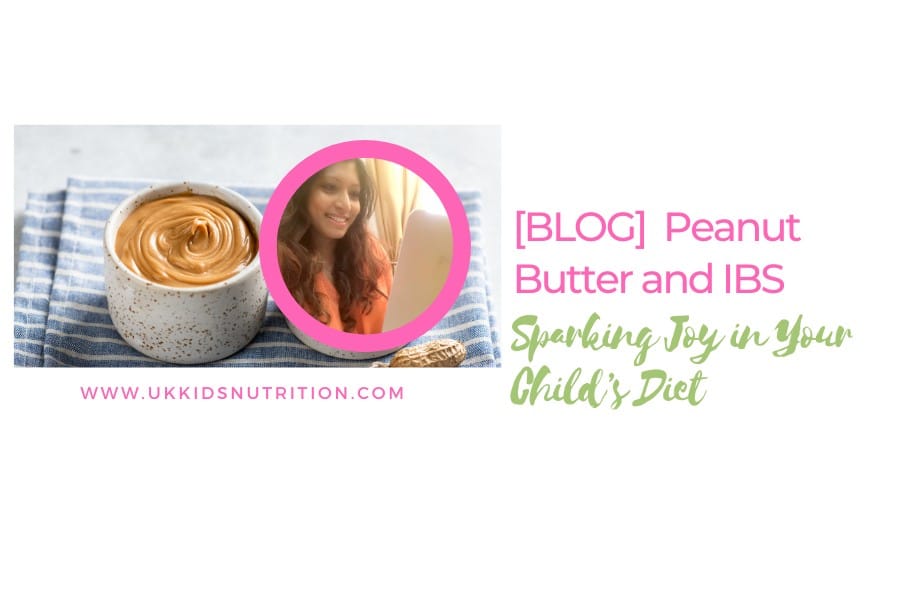
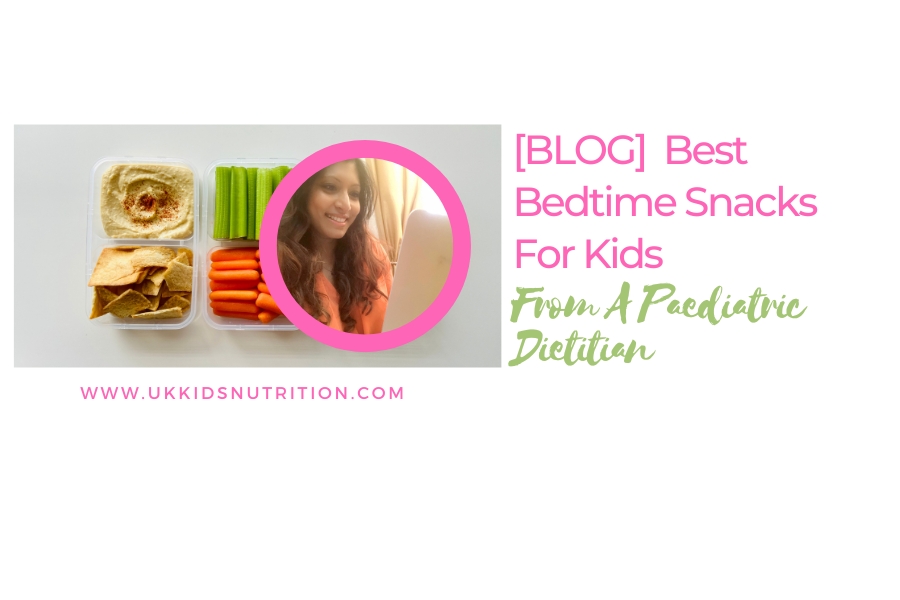
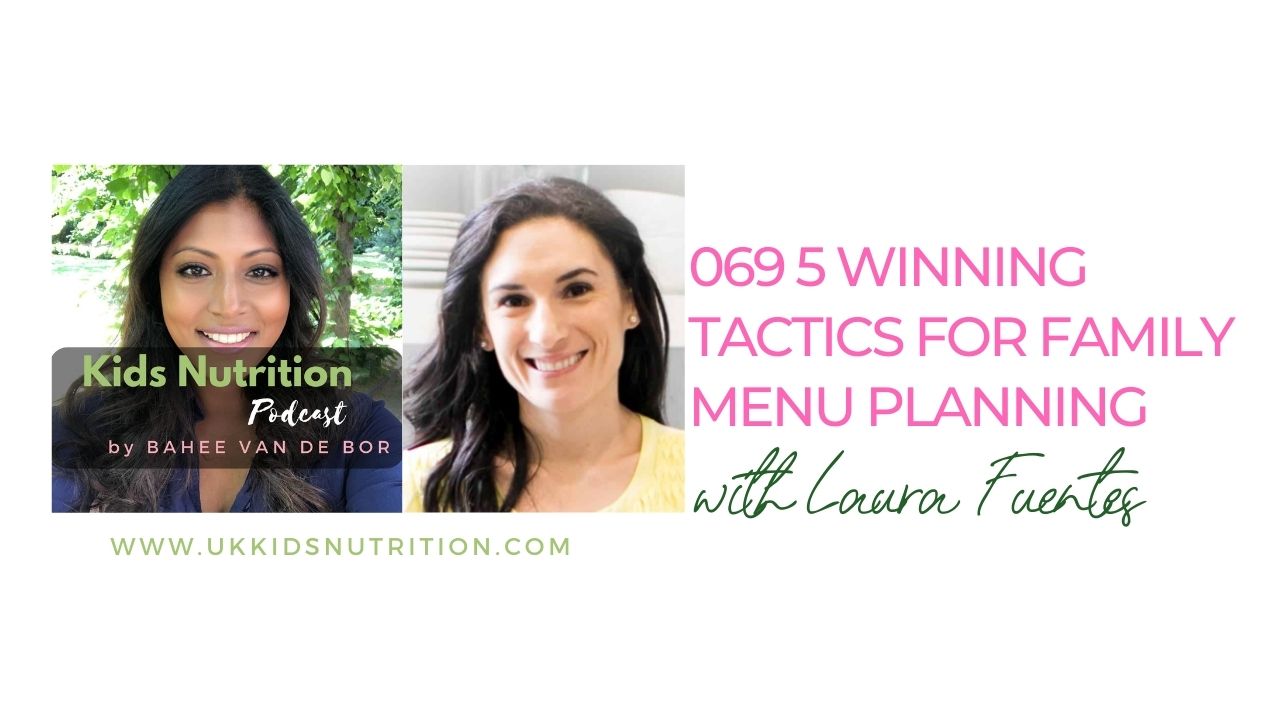
One thought on “How To Sleep Better With Tryptophan Foods”
I love to read your article about “How To Sleep Better With Tryptophan Foods”
Thank you for sharing great expert information. I find it quite instructive and well written post.
I’m sure this article will be more helpful to a lot of readers like me.